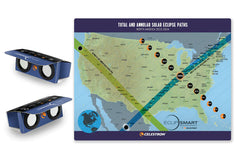2023 Annular Solar Eclipse & 2024 Total Solar Eclipse

What is an Eclipse?
An Annular Solar Eclipse is a type of solar eclipse that occurs when the Moon passes between the Earth and the Sun, but the Moon is too far away from Earth to completely cover the Sun. As a result, a ring of sunlight is still visible around the edges of the Moon, creating what looks like a "ring of fire" in the sky.
A Total Solar Eclipse is a type of solar eclipse that occurs when the Moon passes between the Earth and the Sun, and completely blocks out the Sun's light, casting a shadow on the Earth. During a total solar eclipse, the Moon appears to completely cover the Sun, revealing the Sun's outer atmosphere, called the corona, which is otherwise invisible to the naked eye.
Where will each Eclipse be visible?
The Monday, April 8, 2024, Total Solar Eclipse will cross North America, passing over Mexico, the United States, and Canada. The total solar eclipse will begin over the South Pacific Ocean.
You can see a NASA video tour of this map by clicking here. You can also check out the official NASA Eclipse website for more resources and information.
What time will each Eclipse occur?
The tables below (provided by NASA) summarizes the timings for major cities along the path. There are also interactive eclipse maps provided by the NSO that allow you to find the exact times for your specific location (Annular), (Total).
Annular Solar Eclipse
October 14 2023
| Location | Partial Eclipse Begins | Annularity Begins | Maximum | Annularity Ends | Partial Eclipse Ends |
|---|---|---|---|---|---|
| Eugene, Oregon | 8:06 a.m. PDT | 9:16 a.m. PDT | 9:18 a.m. PDT | 9:20 a.m. PDT | 10:39 a.m. PDT |
| Alturas, California | 8:05 a.m. PDT | 9:19 a.m. PDT | 9:20 a.m. PDT | 9:21 a.m. PDT | 10:43 a.m. PDT |
| Battle Mountain, Nevada | 8:06 a.m. PDT | 9:21 a.m. PDT | 9:23 a.m. PDT | 9:25 a.m. PDT | 10:48 a.m. PDT |
| Richfield, Utah | 9:09 a.m. MDT | 10:26 a.m. MDT | 10:28 a.m. MDT | 10:31 a.m. MDT | 11:56 a.m. MDT |
| Albuquerque, New Mexico | 9:13 a.m. MDT | 10:34 a.m. MDT | 10:35 a.m. MDT | 10:39 a.m. MDT | 12:09 p.m. MDT |
| San Antonio, Texas | 10:23 a.m. CDT | 11:52 a.m. CDT | 11:54 a.m. CDT | 11:56 a.m. CDT | 1:33 p.m. CDT |
Total Solar Eclipse
April 8 2024
| Location | Partial Begins | Totality Begins | Maximum | Totality Ends | Partial Ends |
|---|---|---|---|---|---|
| Dallas, Texas | 12:23 p.m. CDT | 1:40 p.m. CDT | 1:42 p.m. CDT | 1:44 p.m. CDT | 3:02 p.m. CDT |
| Idabel, Oklahoma | 12:28 p.m. CDT | 1:45 p.m. CDT | 1:47 p.m. MDT | 10:49 p.m. MDT | 3:06 p.m. CDT |
| Little Rock, Arkansas | 12:33 p.m. CDT | 1:51 p.m. CDT | 1:52 p.m. CDT | 1:54 p.m. CDT | 3:11 p.m. CDT |
| Poplar Bluff, Missouri | 12:39 p.m. CDT | 1:56 p.m. CDT | 1:56 p.m. CDT | 2:00 p.m. CDT | 3:15 p.m. CDT |
| Paducah, Kentucky | 12:42 p.m. CDT | 2:00 p.m. CDT | 2:01 p.m. CDT | 2:02 p.m. CDT | 3:18 p.m. CDT |
| Evansville, Indiana | 12:45 p.m. CDT | 2:02 p.m. CDT | 2:04 p.m. CDT | 2:05 p.m. CDT | 3:20 p.m. CDT |
| Cleveland, Ohio | 1:59 p.m. EDT | 3:13 p.m. EDT | 3:15 p.m. EDT | 3:17 p.m. EDT | 4:29 p.m. EDT |
| Erie, Pennsylvania | 2:02 p.m. EDT | 3:16 p.m. EDT | 3:18 p.m. EDT | 3:20 p.m. EDT | 4:30 p.m. EDT |
| Buffalo, New York | 2:04 p.m. EDT | 3:18 p.m. EDT | 3:20 p.m. EDT | 3:22 p.m. EDT | 4:32 p.m. EDT |
| Burlington, Vermont | 2:14 p.m. EDT | 3:26 p.m. EDT | 3:27 p.m. EDT | 3:29 p.m. EDT | 4:37 p.m. EDT |
| Lancaster, New Hampshire | 2:16 p.m. EDT | 3:27 p.m. EDT | 3:29 p.m. EDT | 3:30 p.m. EDT | 4:38 p.m. EDT |
| Caribou, Maine | 2:22 p.m. EDT | 3:32 p.m. EDT | 3:33 p.m. EDT | 3:34 p.m. EDT | 4:40 p.m. EDT |
Do I have to wear glasses to observe the Eclipse?
Yes, during the Annular Eclipse you will need to wear safe eclipse glasses or use solar filters if using a telescope or binoculars at all times while observing the sun.
During the Total Eclipse you may only take off your safe solar eyewear when the moon is completely covering the sun during the brief period known as "Totality".
Viewing any part of the Sun through a camera lens, binoculars, or a telescope without a special-purpose solar filter secured over the front of the optics will instantly cause severe eye injury.
Gear Up
We carry many different products to help you safely enjoy the solar eclipse, here are a few of our most popular products:

Eclipse Glasses - Our eclipse glasses are certified to meet all safety standards for direct solar viewing and are produced in the USA by American Paper Optics.

Eclipsmart 2x Power Viewers - These foldable viewers feature plastic lenses with Solar Safe filters and 2x magnification to help you see more detail.

Solar Snap Eclipse App Kit - Safe and innovative, the Solar Snap kit has everything you need to easily photograph an eclipse. Download the provided app, attach the solar filter to your phone and you are ready to capture some eclipse magic!
You can find a full selection of all our solar accessories here





